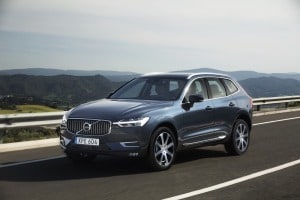Obama-Style Fiscal Cliff Not a Big Threat to Car Sales

The election is finally over and as the dust clears from victory parties, the outlines of the fiscal cliff — the $600+ billion slate of mandatory tax increases and government spending cuts due to take effect at year end — loom ominously in the distance. In the worst case scenarios, studies, such as one by the non-partisan Congressional Budget Office and another by Moody's Analytics, claim that "going over the cliff" could reduce GDP and send the country spiraling into recession in 2013. The good news is that even the experts assign a low probability to the government doing nothing about these potential fiscal changes. The more likely compromise scenarios involve more limited tax hikes and spending cuts and, as such would have a more limited economic impact, including on car sales in 2013.
President Obama ran on a platform of raising taxes. In particular, he has strongly supported letting the Bush-era tax cuts expire for individuals earning more than $200,000 and households earning more than $250,000 a year. The good news is that such tax increases would affect only about 4 to 5 percent of car buyers and these wealthy buyers would be less likely to not make car purchases. Another potential tax rate change — the failure to extend the Alternative Minimum Tax (AMT) patch for inflation — that would affect nearly 30 million Americans in the prime car-buying income brackets is unlikely to happen since both Democrats and Republicans have traditionally supported the patch. The one likely tax change that would affect the majority of car buyers is the elimination of the 2 percent payroll tax cut, but this cut was always in place as a temporary measure for one year and as such was not likely to have been spent on new car payments expected to last three years on average. As a result, the likely tax rate changes should not substantially lower car sales in the near term. In the longer run, though, the growth of car sales could slow if higher tax rates for the "wealthy" result in enough less spending and investment that job cuts result.
The spending cuts appear to be less at risk for going into effect than the tax increases. President Obama has said that he would oppose the $55B in defense spending cuts, for one, and he is unlikely to support any cuts that result in significant job reductions. Plus, the Democrats are resistant in general to cuts to entitlements, such as Social Security. The one likely spending cut — the end of extended unemployment benefits — should not directly affect car buyers since the vast majority of recipients are unlikely to be buying new cars.
The following potential tax changes and spending cuts are discussed below:
End of the Bush-Era Tax Cuts | AMT Patch | Payroll Tax Increase | Emergency Unemployment Benefits Extension
What Could Happen: The main tax rate change set to take place if lawmakers fail to act before January 1, 2013 is the expiration of the Bush-era tax cuts, with the key result that income tax rates will revert back to Clinton-era rates. Plus, households will lose all or part of a variety of tax credits, including the child tax credit, several education tax benefits, the Earned Income Tax Credit, and the marriage penalty relief, while high-income households may lose the ability to take some itemized deductions and personal exemptions in full. Tax rates on dividends, capital gains, estates, and gifts also are due to rise.
What's Likely: The likelihood that all of these changes will occur is not high. President Obama repeatedly has proposed extending the majority of these tax cuts for most taxpayers. That is, he would extend the lower Bush-era income tax rates, dividend tax rates, and capital gains tax rates for the 98 percent of taxpayers earning less than $250,000 in annual income if married and less than $200,000 in annual income if filing single. President Obama also supports eliminating itemized deductions for housing, healthcare, retirement, and childcare for only individuals with more than $1 million in annual income, and limiting the benefit of itemized deductions to 28 percent for only taxpayers in higher rate brackets. In short, his preferred changes would be targeted at upper income Americans and preserve the status quo for the middle class and below. The Republicans, on the other hand, have strongly objected to tax increases for any income levels, supporting spending cuts as a means to reduce the deficit. Currently, the potential compromise that comes up most frequently is to limit tax rates changes to households with more than $1 million in annual income and make up the difference with cuts to entitlement spending.
Expected Impact on New Car Sales: President Obama's preferred tax changes target roughly 4 percent of car buyers, based on the share of car buyers with known household income at or above $250,000 in 2011. If no buyers in this income group decided to buy a new car in 2013, the expected new car sales of 15 million could decrease by as many as 600,000 units. Since car sales are expected to total 14.4 million in 2012, a decrease of this magnitude in 2013 would mean that there would be no growth in car sales from 2012 to 2013.
Such an event is unlikely though. For starters, Edmunds.com estimates that approximately 2.5 million consumers have a vehicle lease ending in 2013. If 80 percent of these lessees buy or lease a new car, then at least 80,000 buyers from the $250,000 and above income group can be expected to remain in the market in 2013 (which is likely a low end estimate given that luxury and other higher end vehicles account for a disproportionately higher share of leases and higher income buyers account for a disproportionately higher share of these vehicles).
Even beyond lease returners who need to replace their vehicles, many consumers in this category may choose to downsize, buying a vehicle with fewer options or a vehicle in a more modest segment, rather than not buying at all. There is adequate room for downsizing, given that over 60 percent of vehicles bought by this income group have an average transaction price above $30,000, compared to 50 percent of over $30,000 vehicles bought by car buyers overall. Still other high income consumers may choose to save less or spend less on other purchases rather than downsize or not buy a new vehicle. As a result, far less than 600,000 car sales would likely be lost if President Obama's preferred tax hikes go into effect.
If a compromise limiting tax hikes to households with more than $1 million in annual income is agreed to instead, then even fewer car buyers would be affected and the high income levels of these buyers suggests that they would be even less likely to not buy a new car due to their additional tax bills. If entitlements are cut to make up for the "lost" tax revenue from extending the cuts to all under $1 million households, then a larger pool of car buyers would be affected, depending on which entitlements are cut. For now, without more information about the nature of these cuts, we assume that their impact on car sales would be comparable to the impact of President Obama's preferred tax hikes of the same value.
View other potential tax changes and spending cuts.
What Could Happen: The Alternative Minimum Tax (AMT) applies to individual taxpayers with incomes above specific thresholds set by law, but for many years, Congress has passed "patches" to index these income thresholds for inflation in order to prevent millions of taxpayers from being subject to the AMT. The last such patch expired on December 31, 2011. Taxpayers subject to the AMT currently must pay the greater of regular income tax or the AMT, which has a top tax rate of 28 percent. If the patch is not renewed, then the thresholds would revert to much lower levels for 2012 and future years and the number of taxpayers affected would rise from about 4 million to approximately 33 million, including many middle class taxpayers.
What's Likely: President Obama's proposed tax plan would permanently extend the AMT and indexes AMT exemption for inflation. In the past, the AMT patch has been a bipartisan effort and it is supported by the Republicans currently. In fact, the key risk to the government failing to pass an AMT patch before the end of the year is from the Democrats' threat to go over the cliff, i.e., to let all tax hikes and spending cuts occur as scheduled. But, the wide-reaching and immediate impact of the AMT as 2012 taxes come due and the difficulties associated with fixing it in 2013 are seen as likely to motivate lawmakers to pass a patch before then.
Expected Impact on New Car Sales: Since the patch is likely to pass, the impact on car sales should be essentially nil.
View other potential tax changes and spending cuts.
What Could Happen: During 2011 and 2012, the share of the payroll tax paid by employees was reduced by two percentage points (from 6.2 percent to 4.2 percent). This decrease was intended as a temporary measure to stimulate middle class spending and boost sluggish economic growth. Employees are scheduled to again pay 6.2 percent in 2013.
What's Likely: Until this week, the payroll tax holiday seemed destined to end as planned this year. Republicans had objected to its extension last year on the grounds that it took funding away from Social Security which needed to be replaced by borrowed funds, and were again in favor of letting it expire at the end of 2012. The Democrats appeared to be in agreement that the temporary measure had served its purpose and should expire. However, reports have started to circulate of growing support in Congress for another extension of this tax, given continued slow economic growth.
Expected Impact on New Car Sales: Whether or not the payroll tax cut is extended, the direct impact on new car sales is likely to be minimal. Since the decrease has been billed as a temporary measure for one year — and any extension will likely be similar, consumers would have been unlikely to spend the additional income on a new car since typical loan and lease terms last three years.
View other potential tax changes and spending cuts.
Emergency Unemployment Benefits Extension
What Could Happen: In addition to tax changes, one key entitlement program set to expire at the end of the year is the Emergency Unemployment Compensation (EUC), a federal program that offers additional aid to unemployed workers who have exhausted their regular state benefits. The EUC program was created on June 30, 2008, and has been modified and extended several times.
What's Likely: Prior to the election, it was generally expected that these federal unemployment benefits would not be renewed again, no matter which candidate was elected. Recently, though, there has been rising support by at least some Democrats in Congress for an extension. President Obama, though, has been fairly quiet since the election about his intentions on this matter.
Expected Impact on New Car Sales: Regardless of whether the program is extended, the direct impact on car sales should be minimal. Even if the long-term unemployed are buying cars, they are undoubtedly not buying new cars.
View other potential tax changes and spending cuts.
Lacey Plache is the Chief Economist for Edmunds.com. Follow @AutoEconomist on Twitter.





